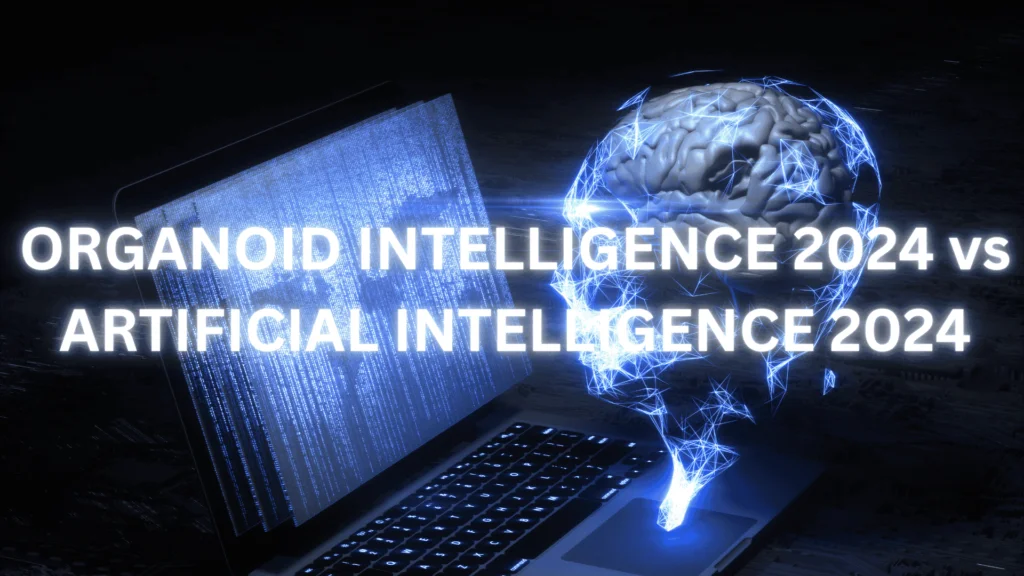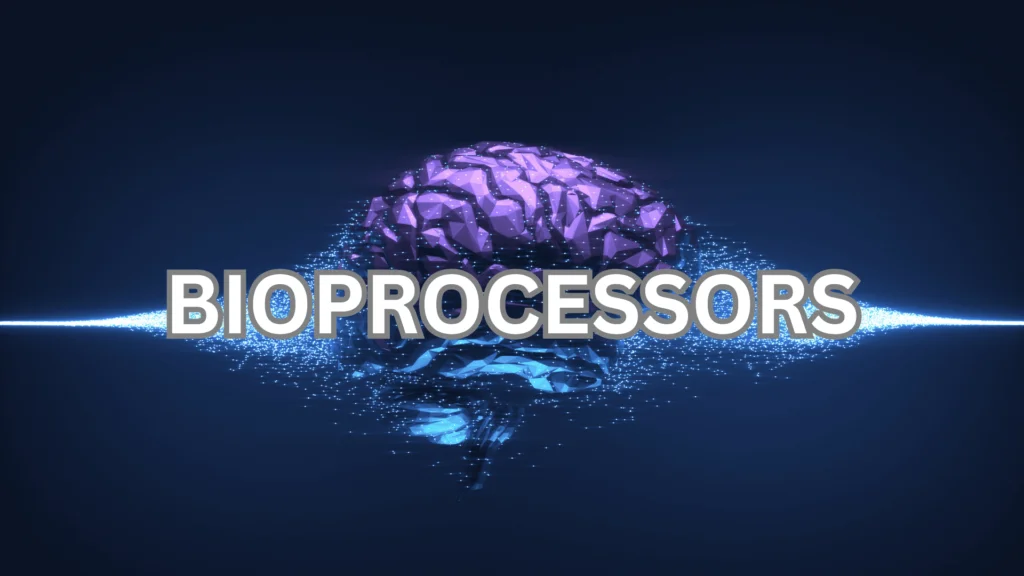Organoid Intelligence 2024 vs Artificial Intelligence 2024
The Future of Thinking Machines
Artificial Intelligence (AI) has substantially affected the tech world over the past years, yet an innovative movement to challenge its rule is emerging—Organoid Intelligence 2024 (OI). As we move forward into a complicated computing ecosystem, we are on the cusp of an intriguing evolution in biointelligence. This blog probes into the subtleties of Organoid Intelligence and compares it to AI, covering recent breakthroughs, their effects, and their future.

What is Organoid Intelligence for the year 2024?
To summarize, Organoid Intelligence suggests the employment of lab-grown biological brain cells for constructing a computational device. Such a device can figure out solutions and make decisions. The OI models are not mere simulations of the brain; they are actively functioning neural platforms. They introduce a new approach to intelligence beyond silicon chips, presenting what some have termed biointelligence.
These bio-processors, powered by real neurons, show a substantial advance in our comprehension of how intelligence can progress. Consider a scenario where computers rely on Finalspark living computers, a neuro platform for truly organic systems capable of learning, adapting, and executing complex tasks through the use of neural networks formed from biological tissues.
The Evolution from AI to OI
There is no doubt that artificial intelligence has changed various sectors, from self-driving cars to predictive models for healthcare. At its heart, AI is constrained by binary processing. It relies on 1s and 0s and on pre-programmed algorithms. Even though AI can replicate thought, it still does not think in the same way that humans or animals do. That’s where the Organoid Intelligence 2024 idea departs.
Contrary to AI, Organoid Intelligence can pick up from immediate experiences, that resembles that of real human brain development. Picture a neuro platform for the brain that goes beyond processing information. It evolves and adjusts, thus enabling abstract thinking and creative problem-solving. While artificial intelligence replicates human actions, organic intelligence is described as being human-like—created from living neurons and neural tissues. To summarize, brain OI systems offer biological dynamics that could outperform AI in terms of adaptability, efficiency, and learning speed.
The Rise of Bio-processors
To move from AI to OI, we require bioprocessors—the fundamental computing pieces in Organoid Intelligence systems. These processors are taken from cultured neural tissues and serve as the cornerstones of biointelligence. There is one of the most engaging advancements in this sector: the first bioprocessor in the world. This has recently been unveiled and displays neural-based computation abilities. Whereas silicon chips consume huge amounts of energy and function according to linear logic, these organic bioprocessors operate in a natural way. This demonstrates the capability to be more energy-efficient and perform with greater dynamism.
It is worth stressing that the possibilities of bioprocessors are not limited to an extended computation; these tools create new opportunities to realize new ideas in different branches of science and engineering. For instance, biocomputers may transform drug discovery procedures by modeling human biological reactions to prescriptive medicines, considerably decreasing the span of typical methods. Furthermore, it could improve the perpetration of accurate diagnostics based on the individual patient’s physiological traits and the subsequent individualized treatment based on their need.

Organoid Intelligence 2024 in Action: A Look at OI Models
So, what mechanisms underlie the functioning of OI models? These are constructed on a base of brain organoids grown in the laboratory—small collections of neurons that reproduce the architecture of the brain. These neural artificial intelligence systems are capable of mimicking the neural activity noticed in actual brains, providing them with the capability to learn and adjust in actual time.
The likely applications are incredible. Envision a Finalspark living computer that not only parses information but changes and refines its neural pathways over time, helping it address increasingly difficult challenges. Unlike AI which is based on code and algorithms constructed by humans, Organizational Intelligence (OI) can virtually ‘grow’ its insights about issues and strategies. This renders Organoid Intelligence 2024 a transformative edge in sectors such as robotics, personalized medicine, and even ethical decision-making.
A Review of Organoid Intelligence 2024 in Contrast with Artificial Intelligence 2024
To better understand the distinction between OI and AI, let’s break down their key differences:
- Learning Mechanism: AI learns using pre-designed data and algorithms, while Organoid Intelligence derives knowledge from organic neural networks, similar to the human brain.
- Efficiency: The use of large neural networks quickly depletes significant quantities of AI energy. Organoid Intelligence, however, incorporates bioprocessors that are by design more energy-efficient, as their function is based on biological principles.
- Creativity: AI is challenged by tasks that call for abstract reasoning or imagination since it depends on specific data sets. Because of their natural composition, OI models can foster creative solutions precisely the way human brains do.
- Evolution: AI is capable of adapting, yet OI expands and changes over time, thereby speeding up learning and promoting better responses to challenges.
AI continues to excel in areas such as data analysis, pattern recognition, and automation, and Organoid Intelligence provides a vision of a potential future where computers might “think” similarly to humans—organically, intuitively, and adaptively.
AI may not be able to replace jobs as seen here, that’s for sure. But with OI, it is still a question.
The Future of Intelligence: Organoid Intelligence 2024 Leading the Charge
Looking into the future, Organoid Intelligence 2024 is positioned to transform industries that heavily depend on adaptive learning capabilities. Finalspark living computers may fundamentally change how we explore deep space as well as how we approach personalized healthcare. Bioprocessors could enable a brain platform to simulate human cognition like never before, providing insights into mental health, brain disorders, and neurological diseases.
Also, the opportunity for organic intelligence presents doors for ethical conversations. If a device becomes bigger, assimilates information, and even ponders, is it entitled to rights? This complicates the relationship between person and technology, causing us to reconsider what actually defines human intelligence. OI models may evolve into self-aware, conscious entities, unlike AI, which follows predefined commands—this potential challenges ethical norms, legal frameworks, and human identities.
The Ethical Considerations of Organoid Intelligence
Given that this new type of intelligence or AI Organoid Intelligence is yet to be fully embraced, the attendant ethical questions cannot be overemphasized. If OI systems can learn and evolve, it would create problem of assigning each OI system its own personality and preferences which would create funny and challenging relationship between OI and mankind. This evolution invites a host of ethical questions:
Rights and Responsibilities:
If OI systems are to become progressively more independent in the future, what rights should they have? Are they just an instrument in our hands just like any other object or are they human beings who can have intellect to decide?
Human-AI Relationships:
The advancement to machines attaining self-consciousness may transform how we consider friendship and cooperation. What are the implications of performing tasks in partnership with a creature that possesses intelligence and emotions? It could change the relations we have and redefine what empathy and social bonds are for us.
Accountability:
If OI systems are making decisions who is accountable for the consequences that arise from these systems’ decisions? If an OI model puts itself or makes unethical decisions, it might be critical to decide who is to blame.
Bias and Fairness:
As with AI, OI systems can have biases inherited from the training data they were fed on. Combating these biases and insuring the fairness in decisions made will be vital to ethical use of OI technologies.
Societal Impact:
The adoption of Organoid Intelligence in several industries may result in otherwise unimagined transformations within society. How will labor markets adapt? What new work positions will there be, and as such, which one will no longer be relevant? Adapting to these changes will require preparation for the future steps in workforce development.
Conclusion: Organoid Intelligence 2024 vs. Artificial Intelligence
With the advent of Organoid Intelligence 2024, we are moving away from the idea of improving AI and toward an exploration of what constitutes intelligence. OI presents a fundamental change away from conventional machine learning and towards biointelligence, where computers develop as if they were living creatures. This technology shift involves more than just technical abilities; it raises philosophical questions about our understanding of intelligence, consciousness, and the relationship between humans and machines.
In the significant debate of Organoid Intelligence 2024 versus Artificial Intelligence 2024, our choice extends far beyond digital advances. We’re making a selection between two futures—one hinged on silicon chips of days past and another on adaptive neural sythe stems of what’s to come. Although AI may reign supreme in the short term, the increasing prominence of brain OI and bioprocessors points to organic intelligence as the potential ultimate frontier.
Welcome to the time of redefined thinking machines and the world’s first bioprocessor, where the boundaries between biology and technology blur, leading us into uncharted territories of innovation, creativity, and ethical reflection. The journey ahead promises to be both exciting and challenging, inviting us to rethink what it means to be intelligent in an increasingly complex world.